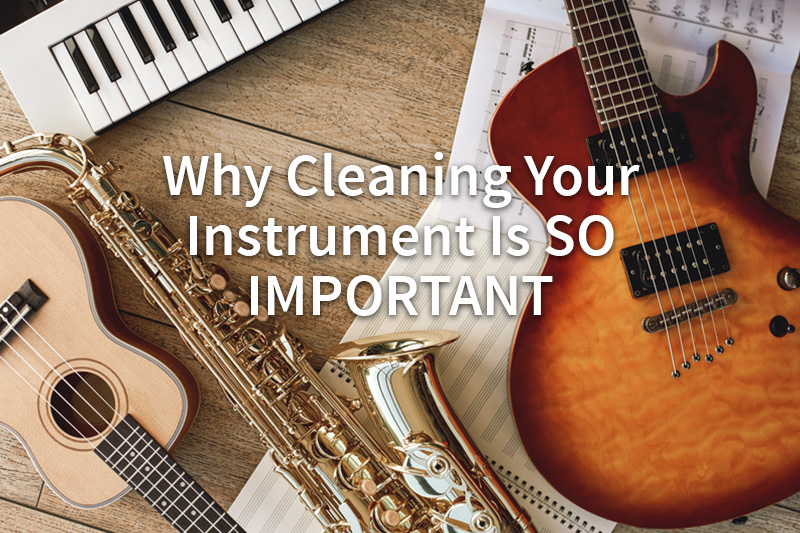Being a musician isn’t all rock and roll, parties, and traveling across the world with your bandmates. In fact, for many people, being a musician is playing in an orchestra, playing for studio bands, playing on the street, or even simply playing in your spare time at home. Furthermore, the stereotypes continue to be redefined as one of the main aspects of being a musician is caring for your instrument and practicing constantly. As a musician, you are always learning and always respecting the instrument that makes it all possible.
 With this comes an understanding of how to clean your instrument, why it is so important that you do, and what the consequences are if you choose not to respect and maintain your instrument accordingly. However, for those just beginning to play or wanting to know more about this respect specifically, you may be wondering why cleaning your instrument is so important, what the risks are if you don’t, and why disinfecting your instrument is more important now than ever.
With this comes an understanding of how to clean your instrument, why it is so important that you do, and what the consequences are if you choose not to respect and maintain your instrument accordingly. However, for those just beginning to play or wanting to know more about this respect specifically, you may be wondering why cleaning your instrument is so important, what the risks are if you don’t, and why disinfecting your instrument is more important now than ever.
To put it simply, cleaning your instrument is highly important because it keeps your instruments sounding and looking new for far longer, increases the lifespan of said instrument in doing so, and also can keep you from becoming sick from infectious illnesses. On top of this, choosing not to clean your instrument can lead to thousands of dollars down the drain from instrument repair and replacement, or cancelled events or tours if the instrument becomes irreparably damaged. For these reasons, if you are starting out, you may want to opt for a low maintenance instrument, learn respect for instruments, and then turn to more complicated and high maintenance instruments in the future.
For a better breakdown of the cleaning process, the results of no cleaning process, how to disinfect your instrument appropriately, and what instruments are best for those that are starting out and not looking to clean as often, let’s take a closer look at these processes and their significance below.
Why you should care for your instrument
To truly play an instrument with passion, you must first respect it. Respect comes from treating your instrument with care and maintaining it for years as you practice and perfect it. As such, cleaning your instrument truly is the best way to create a connection with your instrument. Keep the same instrument for years, and learn to respect its many parts and the way it all comes together to create beautiful sounds and melodies.
When a musician chooses not to clean their instrument, they face the chance that their instrument will deteriorate, rust, tarnish, becoming a breeding ground for dangerous bacteria, or even lose its once beautiful sound. In order to better understand what all of these dangers look like and how they can leave your instrument completely useless over time, let’s take a look at the five most common problems that occur by not cleaning your instrument regularly below.
The Five Most Common Problems That Occur by not Cleaning Your Instrument Regularly
Although it may be obvious that cleaning your instrument is important, you may still wonder what would happen if you chose not to. This is where these five most common problems come into play. These are the most likely outcomes of not cleaning your instrument appropriately and hopefully, reading them here will convince you to take cleaning your instrument seriously moving forward. Also, don’t forget purchasing the instrument cleaning supplies you need.
Tarnishing
 Tarnishing is something that specifically occurs when sulfur in the air reacts with metal (specifically silver, brass, copper, aluminum, magnesium, neodymium and other similar metals), creating a metal sulfide reaction that leads to a darkening or sometimes even green effect on the outer surface of your instrument.
Tarnishing is something that specifically occurs when sulfur in the air reacts with metal (specifically silver, brass, copper, aluminum, magnesium, neodymium and other similar metals), creating a metal sulfide reaction that leads to a darkening or sometimes even green effect on the outer surface of your instrument.
A good example of this can be found with the Statue of Liberty in New York that was once copper in color due to the copper sheets on the outside of the statue which over time reacted with the sulfur in the air and turned green.
However, when it comes to instruments specifically, tarnish usually darkens the outer color of the instrument and turns it into either a brown or black color over time. This can be seen in brass instruments like trumpets and silver instruments such as the flute. The cleaning process to remove tarnish simply requires anti-tarnish polish and a microfiber cloth as well as charcoal strips inside the case of your instrument to absorb the sulfur within.
Bacterial Growth
According to a study performed by Delta Dental, “54% of the woodwind instruments tested had Bacillus bacteria… In 1957, an article in the British Medical Journal reported the ‘rapid spread of tuberculosis within the ranks of a military band’ was caused by the infected Wind Ensemble blowing tuberculosis pathogens onto their bandmates… In 2001, a researcher took interest in a 15-year-old Norwegian baritone player who struggled with recurrent pneumonia… When the musician traveled to the US and didn’t play her horn, her condition improved. Upon returning home and picking up her baritone again, the pneumonia returned… [and] In 2015, The Cavaliers Drum & Bugle Corps canceled their performance at a championship game due to a ‘rapidly progressing, self-limited viral illness amongst the membership.’”
What all of these things tell us is that especially given recent contagious illnesses (COVID-19), we must absolutely disinfect our instruments regularly and only use our own instrument to avoid becoming sick.
Sound Alteration
Although in many cases not cleaning your instrument won’t damage your instrument’s sound, neglecting your instrument is sure to lead to wood warping, metal warping, rust, or even the warping of your skins if you happen to be a drummer specifically.
The main thing to take into account is that cleaning your instrument also involves maintaining it. If your instrument has stuck keys, old parts, rust, erosion, or dust buildup, this will slowly damage the instrument until either it is cleaned or the sound and quality of the instruments is damaged irreparably. The main way to avoid this is to check every part of your instrument as you clean and trade out old and damaged parts accordingly. You will also want to clean every nook and cranny of your instrument to avoid these parts being damaged and becoming stuck or gunked up.
Lifespan Reduction
While this may not come as a surprise to anyone, not cleaning your instrument is sure to reduce the lifespan of said instrument significantly over time. With any instrument, there are countless parts that require attention to function properly. Think of the strings on a guitar, the skins on your drum set, the keys on a saxophone, or even the keys on your piano for instance. All of these things require care and maintenance to perform correctly.
Without this care, all that is left is an instrument that does not sound right and may also be irreparable damaged likewise. For some musicians, this could mean the difference between tens of thousands of dollars as not every instrument is cheap to purchase and to have repaired from a lack of proper care. This is why cleaning your instrument as per the standard requirements will absolutely help you to save money and keep playing without fail.
Rust or Warping
With any instrument that has metal, wood, or plastic parts, you are sure to run into warping and rust if the instrument is not cared for properly. If you are on tour, for instance, you will likely be traveling through various weather conditions that can lead to humidity warping, water damage, or even heat warping.
In order to avoid this, clean your instrument and maintain it frequently, purchase a case that is immune to multiple weather situations, and do not leave your instrument out even if it is in your garage (during extreme weather conditions) to avoid damage.
What Instruments are the Most Difficult to Maintain?
Another big question you will likely see a lot online from parents and beginners specifically looking to have their children learn a new instrument or wanting a low maintenance hobby is what instrument is the least difficult to maintain and which are the most high maintenance instruments to avoid.
The answer to this question truly all depends on the type of instrument we are talking about. Perhaps the most difficult instruments to maintain across the board would be the drums, piano, brass and woodwind instruments, and any unique instruments that are more rare nowadays such as the Theremin and the Glass Harmonica.
On the other hand, the most low maintenance instruments are usually string instruments like the guitar, band percussion instruments such as the snare drum, and the keyboard which eliminates a lot of the problems that arise with the piano specifically.
How to Disinfect Your Instrument

When it comes to string instruments, percussion instruments, and pianos or keyboards, most of the bacterial risk can simply be avoided by cleaning your hands before and after use thoroughly. However, when it comes to brass and woodwind instruments that require oral use, this risk becomes far higher.
According to the Center for Disease Control, “Coronavirus disease is a respiratory illness that can spread from person to person. The virus is thought to spread mainly between people who are in close contact with one another (within about 6 feet) through respiratory droplets produced when an infected person coughs or sneezes.” The virus can also be spread through hands especially if you sneeze or cough into your palm. This means that even the instruments less likely to spread the virus may still do so.
Essentially, the best way to avoid spreading this virus and bacteria as well is to disinfect your instrument thoroughly. In order to disinfect instruments that don’t come in contact with your mouth, simply use disinfectant spray that is non-ammonia, use wipes to wipe down all of the parts and pieces of the instrument, and continue doing so before and after every use.
When it comes to instruments that do come in contact with your mouth, use gloves to apply a cotton swab with denatured isopropyl alcohol to the mouth area as well as the keys and any other area that may come in contact with your mouth or hands. If it is a flute, use a soft, lint-free silk cloth inserted into the cleaning rod to clean the inside of the headjoint thoroughly to remove the respiratory droplets.
If the instrument is brass, use the same alcohol and cotton swab procedure as well as warm soapy water to rinse the mouthpiece in. You may also want to use a Sterisol germicide solution on it likewise and for any hard rubber or ebony mouthpieces, you can also use a hydrogen peroxide and water mixture to disinfect it regularly as well.
Now that you know exactly why cleaning your instrument is vital to its longevity and sound as well as your health, all that is left is to clean and disinfect your own instrument in the way it is intended and see the results of an instrument cleaning today. For a comprehensive look at the various appropriate cleaning supplies for every instrument, check out our instrument cleaning supplies list as well and get fully stocked up on all the essentials today.


